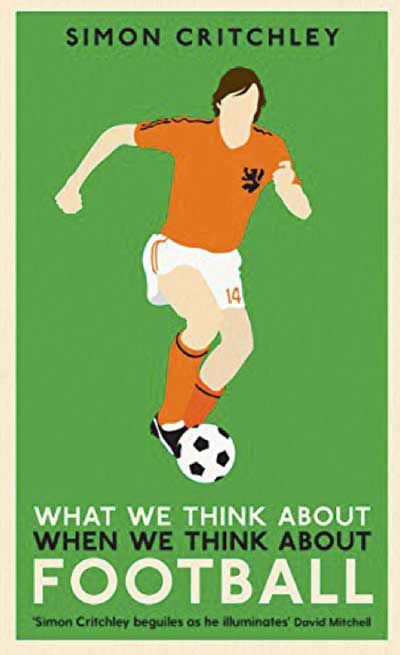
Profile Books, £8.99
Reviewed by Charles Morris
From WSC 371, January 2018
Buy the book
The more thoughtful football fans might rush optimistically to read this book, eager to have their compulsion explained. Why do we invest so much time and money following, thinking and talking about what is only a game? Surely philosophy professor and Liverpool fan Simon Critchley is just the man to enlighten us.
Alas, this pocket-sized, neatly designed book will disappoint such readers. Its attractive look and array of excellent photographs give an appealing veneer to what is essentially a philosophy textbook that will leave those unfamiliar with the subject nursing a sore brain.
Words such as “parrhesia” and “mimesis” rear their impenetrable heads too often. And phrases such as “the adumbration of an inaccessible interiority, a reality that resists commodification” – referring to the 2006 film Zidane – will have readers reaching for the paracetamol. Another irritation is that captions for the photographs are at the back of the book rather than alongside the pictures, requiring a regular scramble through the pages.
Critchley’s aim is to take a “phenomenological” approach to the game and “outline a poetics of football experience”. By this he means reflecting deeply on the experience of watching the sport and finding words to describe the theatre, time, space and beauty that players and supporters combine to create.
In this he succeeds, and does lighten the load of his intellectual arguments with illustrations and examples from football’s past and present, relying heavily here on his beloved Liverpool. He considers the essentially social, collaborative nature of a team game watched by spectators, its tribalism and its capacity to make people lose themselves in its drama. He writes well about the effect of crowds and the importance of a club’s shared history, as well as providing more down-to-earth criticisms of the modern game’s greed and corruption.
Some opinions are questionable. He states that complex tactical plans “quickly become meaningless” once a game starts. Those who have watched José Mourinho’s teams repeatedly “park the bus” to gain a narrow win or draw in difficult away fixtures might beg to differ. And, referring to Zinedine Zidane’s dismissal at the end of the 2006 World Cup final, he writes: “Heroism always leads to self-destruction and ruination.” Yet for every Diego Maradona and George Best, there is also a Pelé and a Bobby Charlton.
The best and most readable chapter is the last, where he drops the academic style to summarise the many ills of the modern game on the one hand, but on the other lauds the magical power of great goals and winning performances that transport fans to what he calls “sensate ecstasy”.
It says much about the book, however, that my one abiding memory of it is Critchley’s anecdote about him and his nephew being utterly convinced they saw the ghost of the author’s father, another Liverpool fanatic, while queuing for a cuppa at Goodison Park before a Merseyside derby.